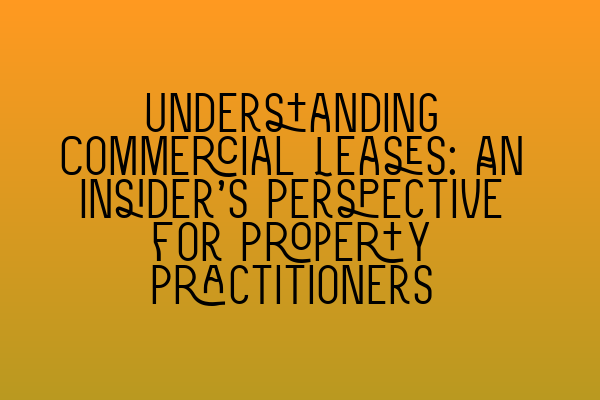Understanding Commercial Leases: An Insider’s Perspective for Property Practitioners
Welcome to SQE Property Law & Land Law! As experts in property law, we understand the intricacies and complexities of commercial leases. In this blog post, we will provide an insider’s perspective on understanding commercial leases, offering valuable insights for property practitioners like yourself.
Before we dive into the details, let’s clarify what a commercial lease entails. A commercial lease is a legally binding agreement between a landlord and a tenant for the rental of a commercial property. This type of lease is commonly used for retail spaces, offices, industrial units, and other non-residential properties.
The Key Elements of a Commercial Lease
When it comes to analyzing commercial leases, it is essential to familiarize yourself with the key elements that comprise these agreements. By understanding these elements, you can ensure a comprehensive and effective assessment for your clients.
1. Duration of the Lease
The duration of a commercial lease is a crucial factor that both parties need to agree on. Typically, commercial leases have longer terms compared to residential leases. It is common to see lease terms ranging from 5 to 20 years. However, it’s important to note that shorter leases with options to renew are becoming more prevalent.
Understanding Contractual Capacity: Rights and Limitations
2. Rent and Rent Reviews
Commercial leases specify the amount of rent the tenant is obligated to pay. It is essential to assess how the rent is calculated and whether it includes any additional costs, such as service charges or insurance premiums. Additionally, commercial leases often include provisions for rent reviews at regular intervals to account for changes in market conditions.
Interactive SQE Mock Tests for Contract Law: Test Your Knowledge
3. Repair and Maintenance Obligations
Commercial leases outline the repair and maintenance obligations of both the landlord and the tenant. It is crucial to analyze these provisions thoroughly to determine who is responsible for various aspects, such as structural repairs, common areas, and utilities. Additionally, it’s important to consider the implications of these obligations on the value and condition of the property.
4. Use and Alterations
Commercial leases specify the permitted use of the property by the tenant. It is crucial to review these provisions to ensure compliance with current laws and regulations. Additionally, commercial leases often include restrictions on alterations, requiring the tenant to obtain the landlord’s consent before making any changes to the property.
Common Pitfalls and Important Considerations
While understanding the key elements of a commercial lease is essential, navigating the potential pitfalls and considering additional factors is equally crucial. Here are some important considerations property practitioners should keep in mind:
1. Break Clauses
Break clauses allow either the landlord or the tenant to terminate the lease before the expiry of the fixed term. However, break clauses often come with specific conditions and notice requirements. It is crucial to analyze these clauses thoroughly to establish the rights and obligations of both parties.
2. Rent Arrears and Insolvency
In the ever-changing business landscape, the risk of rent arrears and insolvency is a significant concern for landlords. Property practitioners should consider including provisions in commercial leases that address these risks, such as rent deposit clauses or personal guarantees from the tenant’s directors.
Join Our SQE Contract Law Webinars: Expert Insights and Guidance
3. Dispute Resolution
Commercial leases should include clauses that set out the procedures for resolving disputes between landlords and tenants. This can range from negotiation and mediation to arbitration or litigation. It is crucial to draft robust dispute resolution clauses that protect the interests of your clients.
The Importance of Professional Assistance
Given the intricacies and potential complexities involved in commercial leases, it is crucial for property practitioners to seek professional assistance. As a solicitor specializing in property law, you play a vital role in guiding your clients through the lease negotiation and drafting process, ensuring that their interests are protected.
At SQE Property Law & Land Law, we offer expert guidance and support for property practitioners like yourself. Our team of experienced solicitors can assist you in understanding and navigating the intricacies of commercial leases, helping you deliver exceptional service to your clients.
SQE Prep: Mastering the Essentials of Contract Law
Conclusion
Understanding commercial leases is crucial for property practitioners, as it allows you to guide your clients effectively and protect their interests. By familiarizing yourself with the key elements of commercial leases and considering the important considerations and potential pitfalls, you can ensure that your clients have a comprehensive understanding of their lease agreements.
Remember, professional assistance is invaluable in navigating the complexities of commercial leases. At SQE Property Law & Land Law, we are here to support you and provide expert insights to help you excel in your practice.
Contractual Capacity: Understanding Legal Competence in Contracting Parties
